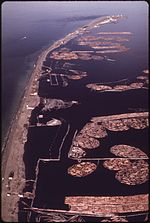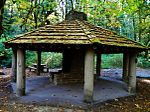Elwha River

The Elwha River is a 45-mile (72 km) river on the Olympic Peninsula in the U.S. state of Washington. From its source at Elwha snowfinger in the Olympic Mountains, it flows generally north to the Strait of Juan de Fuca. Most of the river's course is within the Olympic National Park. The Elwha is one of several rivers in the Pacific Northwest that hosts all five species of native Pacific salmon (chinook, coho, chum, sockeye, and pink salmon), plus four anadromous trout species (steelhead, coastal cutthroat trout, bull trout, and Dolly Varden char). From 1911 to 2014, dams blocked fish passage on the lower Elwha River. Before the dams, 400,000 adult salmon returned yearly to spawn in 70 miles (110 km) of river habitat. Prior to dam removal, fewer than 4,000 salmon returned each year in only 4.9 miles (7.9 km) of habitat below the lower dam. The National Park Service removed the two dams as part of the $325 million Elwha Ecosystem Restoration Project. Dam removal work began in September 2011 and was completed in August 2014. The river has already carried sediment to its mouth, creating 70 acres of estuary habitat at the Strait of Juan de Fuca. The first documented use of the name Elwha River dates to Henry Kellett's 1846 map.
Excerpt from the Wikipedia article Elwha River (License: CC BY-SA 3.0, Authors, Images).Elwha River
Charles Road,
Geographical coordinates (GPS) Address Phone number Website Nearby Places Show on map
Geographical coordinates (GPS)
| Latitude | Longitude |
|---|---|
| N 48.150555555556 ° | E -123.55972222222 ° |
Address
Eaglewolf House Counseling
Charles Road 407
98363
Washington, United States
Open on Google Maps








